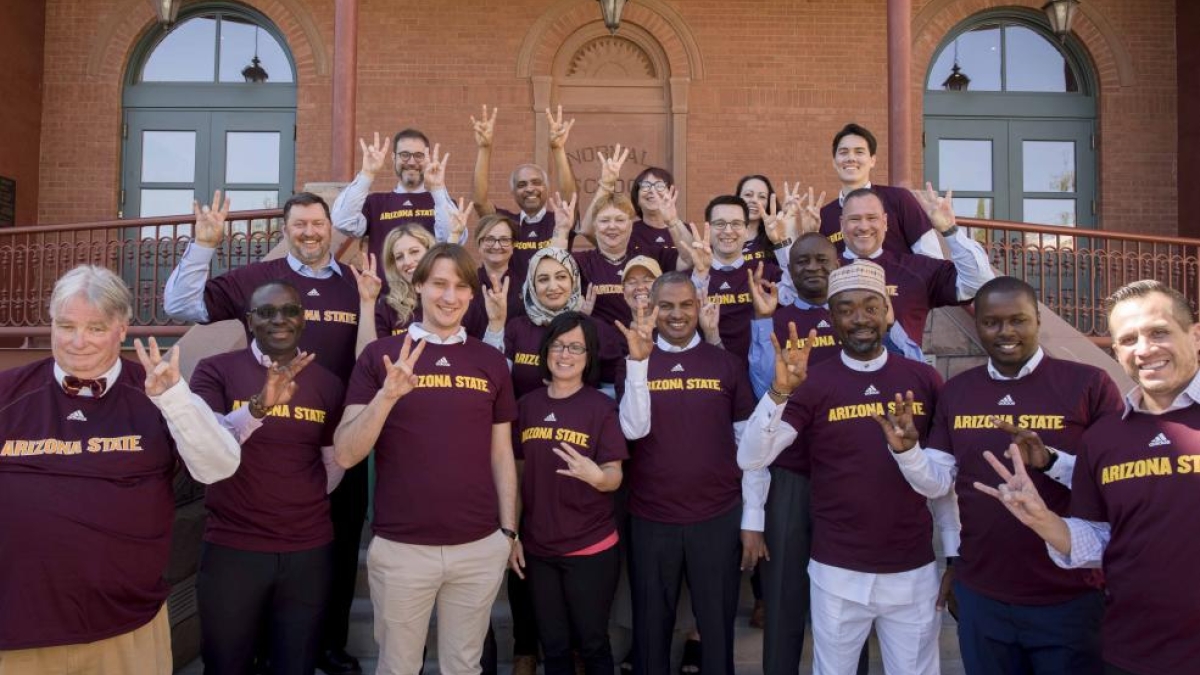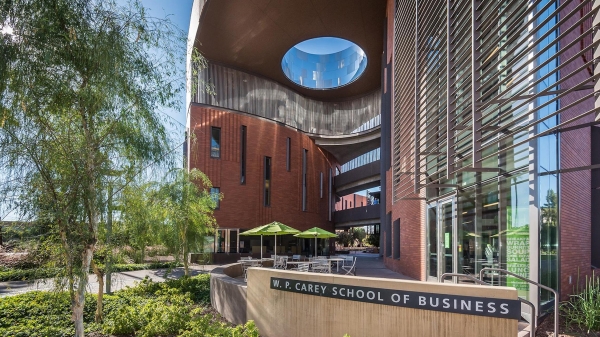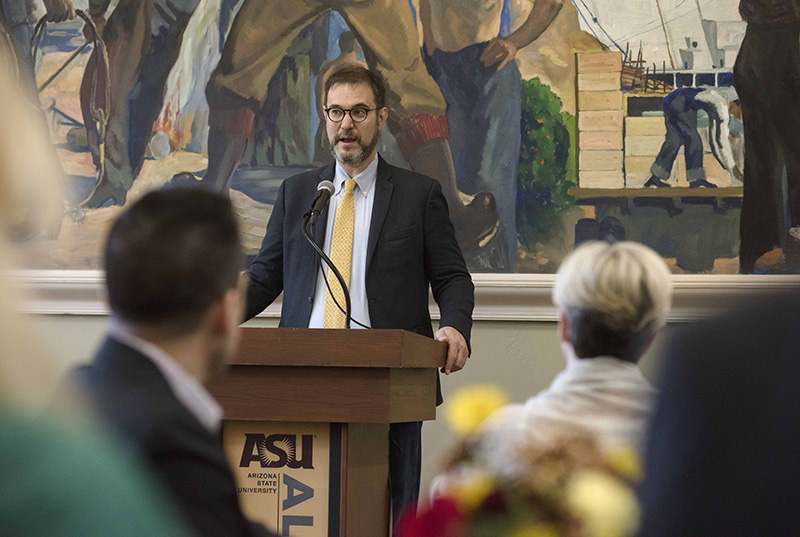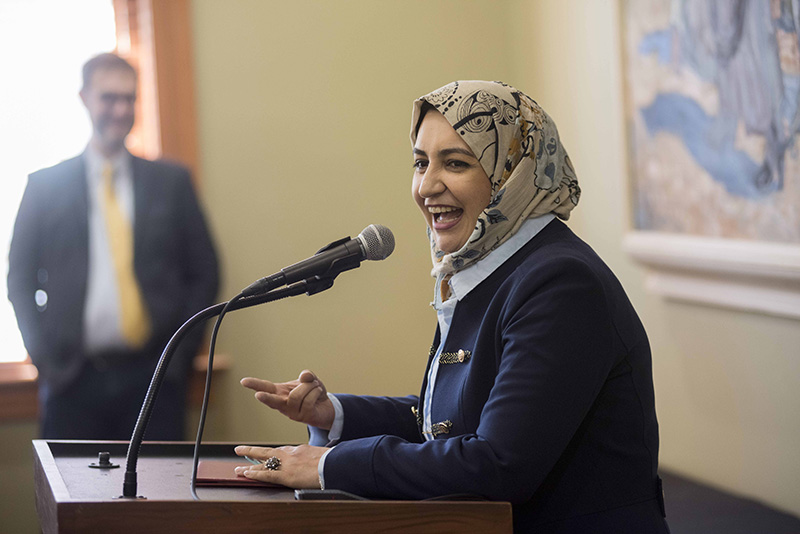ASU grants 'MiniMasters' to Chemonics employees at global graduation

Students, faculty and administrators from Chemonics and ASU pose in front of Old Main after the graduation ceremony.
In the spirit of educational access for all, Arizona State University has awarded MiniMasters certificates in global supply chain management to over 350 Chemonics International employees in 25 developing countries across the globe, with the intent of empowering the world’s next generation of international development professionals.
The pilot program was launched in August 2018 by ASU and Chemonics International, an international development company working in 75 countries around the globe. The program provided a unique opportunity for Chemonics’ global employees to pursue accredited, accessible continual learning.
“Education is the only path to global peace, harmony and prosperity,” said Amy Hillman, dean of the W. P. Carey School of Business at ASU, during her remarks at the MiniMasters graduation ceremony on April 8. “The more we understand about one another, the more we understand about each other’s motives, cultures, political constraints, etc. This joint effort in education from ASU and Chemonics is helping develop a deeper understanding of cultures around the world and serves as an example of how innovative organizations are capable of helping individuals with different backgrounds work together and overcome differences.”
According to Stephen Feinson, associate vice president of ASU International Development, the MiniMasters certificate program was created out of discussions with Chemonics about their goal of providing affordable, world-class continual learning opportunities to their 5,000 employees worldwide.
“ASU is pioneering new ways to connect international development issues across many disciplines through research and lifelong access to learning,” Feinson said. “This program combines ASU’s forward-thinking approach to international development with our expertise in breaking down boundaries in education and research. It engages international development professionals across the world while utilizing education technologies to increase access.”
Stephen Feinson speaks at the MiniMasters graduation ceremony at Old Main on April 8, 2019. Photo by Laura Segall
“I came from Afghanistan where educational resources are limited for females,” said Wadia Waheed, an accounts payable associate at Chemonics’ headquarters office in Washington, D.C., who attended the graduation ceremony. “Being a mom of four kids with a full-time job made it hard for me to pursue further education. The MiniMasters degree was very valuable for me because it was a way to pursue continual education, be a working mom and not take on a financial burden for my family. We need opportunities like this.”
“Continual learning is an integral part of Chemonics’ culture and we constantly encourage our staff to learn new technical areas and grow as development professionals,” added Susi Mudge, president and CEO of Chemonics. “I’m thrilled this program with ASU exposed our global workforce to new areas in which they can have global impact.”
According to Jamey Butcher, executive vice president of Chemonics, ASU was a natural choice for partnership as the university's mission is closely aligned with Chemonics’ mission to promote meaningful change around the world to help people live healthier, more productive and more independent lives.
Classes in the program were taught by ASU faculty within the W. P. Carey School of Business and utilized innovative online learning platforms such as Canvas and Yellowdig to connect students to their faculty and to each other.
“The class brought everyone together and we all worked as a team,” said Kelechi Enweruzo-Amaefule, a state strategic engagement manager working with the Chemonics-implemented USAID Global Health Supply Chain Program - Procurement and Supply Management project in Nigeria. “It helped us integrate our work, both within the project in Nigeria and also learn from other employees' ideas and experiences globally. I now have a greater understanding of others’ jobs, for example procurement processes and quantification and distribution, and can better contribute to and complement what they do. The program has increased our capacity and encouraged this integrated approach.”
Before the program, Waheed felt as if she executed financial tasks solely because it was required of her, without understanding all of its complexities.
“Now I know the rationale and importance as to why I am doing things a certain way,” Waheed said. “(The MiniMasters program) has given us the confidence to better understand what we do and why. It’s given us the tools to deliver this knowledge to others as well.”
Wadia Waheed speaks at the MiniMasters graduation ceremony at Old Main on April 8, 2019. Photo by Laura Segall
According to Mudge, Chemonics hopes to continue offering the program, while exploring additional needs of Chemonics’ global workforce and expanding their continual learning offerings with ASU.
The MiniMasters program was not only a test of success for ASU and Chemonics, but also a global test for how to engage people around the world.
“This was a pilot program to explore how we can educate international development professionals,” Feinson said. “Now we want to see how this program scales to impact more people.”
Aside from this program, ASU International Development and Chemonics are working together to bring innovation to other industries including supply chain management, monitoring, evaluation, learning, conservation and biodiversity.
ASU International Development is also involved with rule of law projects in South America, education projects in Pakistan, and other projects around the world. For the future, ASU International Development is focused on perfecting university design models that will work in the developing world.
Written by Maya Shrikant
More Business and entrepreneurship

Arizona Business and Health Summit asks attendees to innovate for value
Arizona State University's W. P. Carey School of Business hosted the third annual Arizona Business and Health Summit, sponsored…

An economic forecast with lots of variables
The prospect of a new presidential administration is prompting some discussions among top economists.Tariffs, immigration,…

ASU MBA ranked No. 1 in the US for entrepreneurship
In the Poets&Quants 2025 Best MBA Programs for Entrepreneurship ranking released today, the W. P. Carey School of Business at…

